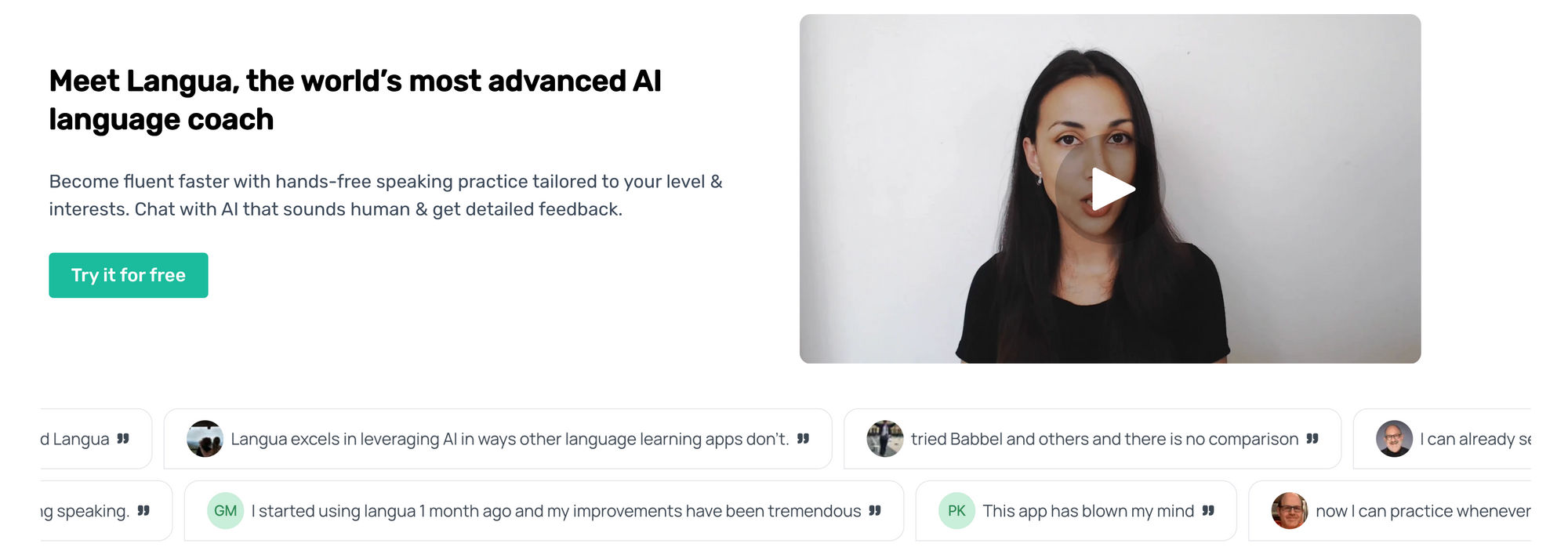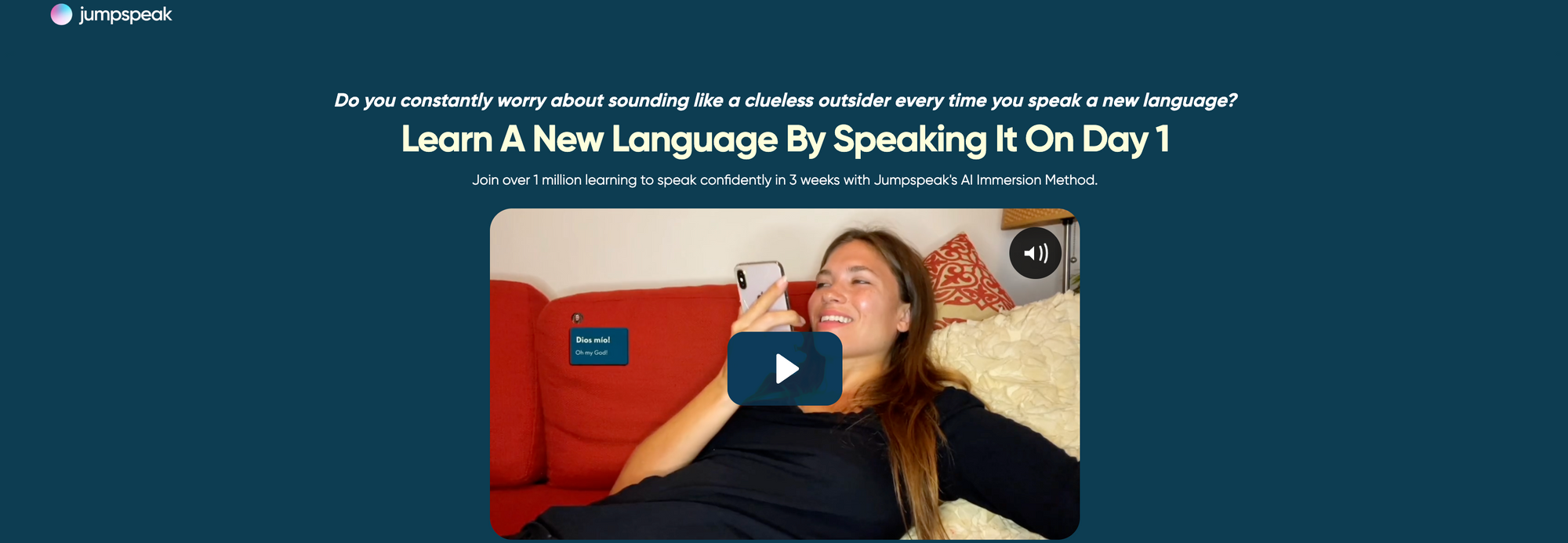What's the best AI language learning app in 2026?
You want to become a fluent speaker. But you're not ready to stumble through conversations with natives. Even if you are ready, it's hard to find native speakers who are willing to help you practice.
This is where AI language learning apps should help. Problem is, many of them are pretty terrible - robotic voices, repetitive replies, weak feedback. I've tested dozens and most fall short. ChatGPT's better than nothing, but it's a general-purpose tool that isn't made for language learning.
In this article, I'll share the best AI language learning apps and help you choose the right one for your needs.
Which is the best AI for language learning?
If you're serious about learning a foreign language, it makes sense to use a tool that's specifically designed for this task, rather than ChatGPT. Below are my top recommendations in order:
#1: Langua
Langua is the most realistic AI app for language learning. The voices are cloned from native speakers, making conversations feel genuinely human. Combined with detailed feedback, intelligent vocabulary integration, and optional grammar drills based on your mistakes, it's built for those serious about reaching fluency. It also offers a free trial.

Pros
- Conversations designed specifically for language learning. Before you start chatting, you'll see lots of interesting conversations to choose from, e.g. roleplays related to travel or integration, debate topics, discuss your day, etc.
- Most language learning apps sound robotic. On Langua, it feels like you're talking with a human. Takes a little getting used to! Some of the voices are cloned from YouTubers in the language learning space who Langua has partnered with.
- For most languages, you can choose your preferred dialect.
- Multiple ways to get feedback - written corrections with explanations, verbal corrections directly from the AI in its replies, and a detailed feedback report following your conversation.
- Click on words/sentences to see translations and usage examples.
- After you save words and phrases, you can learn them via spaced repetition flashcards, or go to the 'vocab' section in the chat tool. The AI will intelligently incorporate your saved words into the conversation. It's quite remarkable.
- Speak in your language when you're stuck - Langua's technology will usually be able to understand.
- Available on all devices: desktop (via website) or tablet/mobile via apps: iOS (Apple) | Android (Google Play)
Cons
- Occasionally, the AI might miss a correction. This is a problem with all AI at present, as the technology isn't perfect.
- Like other conversation practice tools, it can be tricky for beginners (though Langua does have an innovative guided course for beginners, and suggested replies to help you respond).
- 'Only' 23 languages have been officially launched so far (includes all the main ones - Spanish, French, English, German, Italian, Japanese, Chinese, Portuguese, etc.)
Pricing
Two tiers are available (Unlimited & Standard), both as a monthly or annual subscription - see pricing here. Monthly has a 5-day free trial, whilst annual has a 7-day free trial available.
You can create a free Langua account and explore it here.
Full disclosure: I co-founded Langua because generic AI tools like ChatGPT were not properly meeting the needs of language learners like me. For an independent opinion, below is a YouTube video by an English teacher and Spanish learner who tried several AI language learning apps. She briefly explains why she feels that Langua is the best option:
#2: Duolingo

Whilst Duolingo isn't specialised in AI language learning, it recently introduced two AI-powered features.
The Video Call feature (which requires a $30/month 'Max' plan) enables users to converse with Lily, one of Duolingo's animated mascots. Additionally, 'Adventures' offers a simulation-style game that immerses users in lifelike scenarios (reminiscent of The Sims for those familiar with the classic game).
Pros
- Duolingo is a trusted brand, used by millions of learners around the world.
- The AI features are somewhat integrated with the rest of the Duolingo experience.
Cons
- The conversation practice tool is nowhere near as engaging and realistic as on Langua.
- At the time of writing, you can only chat to an animated sulky teenage character, Lily. Frustrating that they don't allow you to talk to varied characters with different ages & dialects, like you would in real life.
- Conversation practice still feels like something of an afterthought on Duolingo -the focus is still very much on simple games.
- Currently the calling mode is limited to a few languages (Spanish, French, English), and only available with the most expensive plan.
Pricing
Duolingo Max costs $30/month at the time of writing. Not cheap!
#3: Speak
Speak is more polished than many AI language apps, with engaging roleplay scenarios and a helpful tutor feature for grammar questions. It works well for beginners who want structured practice, though the feedback lacks depth, the flexibility and personalization isn't on the same level as Langua, and the subscription tiers can be confusing.

Pros
- Clear, natural-sounding voices and relatively accurate speech recognition.
- Flexible "Speak Tutor" feature for asking grammar questions and requesting custom lessons.
- Polished, intuitive interface with well-paced beginner content, including helpful videos.
Cons
- Feedback is brief and lacks the depth needed for sustained improvement (Langua is far ahead in this regard).
- Limited variety in lesson types - can feel repetitive at higher levels. It's better suited for beginners.
- No spaced repetition system or long-term vocabulary tracking.
- Confusing premium tier structure with unclear AI lesson limits.
- Limited control over voice selection and regional accents.
Pricing
Speak offers Premium and Premium Plus tiers. The pricing varies by country, but Premium Plus (which includes unlimited custom lessons) is significantly more expensive than the base tier. The distinction between tiers wasn't clear to me at signup.
Read an in-depth Speak review here.
#4: TalkPal
Whilst not as realistic or well designed as Langua or Speak, TalkPal is another option if you're looking for a conversational AI for language learning.

Pros
- It offers several options for chatting. In the paid version, you can choose a role play, have a debate about a particular topic, or describe images shown to you.
- There's an interesting pronunciation practice tool, however in my testing it was giving me positive feedback for making intentional errors.
- It's cheaper than some other options but this comes with disadvantages, as discussed below.
Cons
- The voices are somewhat robotic compared to the voices you'll hear on Langua.
- The questions are not the best. For example, below is the first question I received when starting a conversation (with my level set to basic). I'm asked what I'd consider to have been the most significant moment in human history, and why. I'd need to think a lot to answer this. It's not a good question for someone who is trying to learn a language.
- Limited ways to practice the new vocabulary you come across.
- Pronunciation feedback is not reliable - it would often tell me I was correct when I intentionally made major errors.

Pricing
$9.99/month. No free trial. There is a basic plan, but it has a 10-minute limit and doesn't give you access to many of the features.
#5: Praktika
Praktika offers well-organized lesson paths and animated avatars, but the experience falls short in key areas. The learning paths are rigid, feedback is limited and easy to miss, and there's no vocabulary retention system or spaced repetition.

Pros
- Natural-feeling conversations that adapt well to your level, especially at intermediate stages.
- Clean, intuitive interface with well-organized lesson paths.
- Beginner lessons include helpful scaffolding and guided questioning.
- Large library of conversation topics available for on-demand practice (around 140 topics).
Cons
- Learning paths are rigid - changing goals resets your progress.
- Feedback is limited and easy to miss during conversations.
- Animated avatars can be distracting or fall into the uncanny valley, with no audio-only option.
- No spaced repetition or long-term tracking of saved vocabulary.
- Limited custom lesson options compared to more flexible competitors.
Pricing
Praktika requires a minimum 3-month commitment with no month-to-month option. Pricing varies by country. All features are included in a single subscription tier with no confusing upsells.
Read a full Praktika review here.
A word of caution: many AI language apps use Instagram ads that oversell their capabilities. Jumpspeak is a case in point - the reality doesn't match the marketing. We found that the conversational experience was unnatural and the feedback was extremely limited, contradicting the advertised experience.

Common questions related to the use of AI in language learning
How can AI language tutors be used for learning?
Most AI language learning apps focus on conversation practice. They aim to simulate real-life conversations, whilst providing feedback, corrections and translations when needed. The best apps also include voice recognition technology in order to understand what you're saying. Certain tools, such as Langua, also use AI to transcribe podcasts and videos, allowing you to read and listen simultaneously. Other possibilities include the creation of simple stories that focus on your target vocabulary or favourite topics.
Can I use ChatGPT to learn a language?
Yes, you can use ChatGPT for language learning, however as mentioned in this article, it has limitations and you may want to explore AI tools that are specially designed for language learning. Nevertheless, ChatGPT is a reasonable option for conversation practice, and can also give you corrections on your use of vocabulary and grammar. Note that it's knowledge of languages varies depending on its training data. Accuracy is not perfect for languages that are not amongst the most popular globally. For a full breakdown of how to use ChatGPT for language learning (and where it falls short), see our practical guide to learning a language with AI.
Is ChatGPT the best AI for language learning?
I've extensively tested ChatGPT's capabilities. Whilst the technology is incredible, for many reasons, it isn't the best platform for learning a language. Here's why:
- When you start conversing, ChatGPT will typically suggest a generic topic like music or food. Whilst these are fine, after a while you'll need more inspiration and ideas.
- The AI cuts you off mid sentence all the time. Frustrating! This is because the speech detection isn't designed for learners who need time to form sentences.
- When you make mistakes, ChatGPT won't correct you, unless you ask it to. In my experience, the tool would often forget to correct me, and I had to keep reminding it to do so.
- When replying, it often won't ask you a question to keep the conversation flowing. Or it will ask three questions at once - too many for someone learning a language! This can be improved with careful instructions, but these instructions are often forgotten after a certain number of messages.
- When learning a language, the ability to read what you've just heard is extremely helpful. But if you turn on speaking mode, you cannot see the text simultaneously. Nor can you click on words or sentences to see translations.
What's the best free AI for language learning?
ChatGPT is your best free option. It's fine for advanced learners who want conversation practice. However, it has significant limitations for language learning (covered in detail in the FAQ above).
For serious practice, you'll want a tool specifically designed for language learning. Most of these require a subscription, though Langua, my top recommendation, offers a free trial, which gives you enough time to see if the features (expertly designed conversational exercises, detailed feedback, vocabulary integration etc.) are worth paying for. Keep in mind that with any tool, your progress depends on consistent practice.
What are the limitations of AI language tutors?
While advanced, AI language tutors may not fully replicate the nuances and complexities of natural human speech. The AI may not always correct grammar errors or offer the depth of feedback a human tutor could provide. AI language teachers also cannot compete with the feeling of human connection you get when speaking with natives. Lastly, you should avoid sharing sensitive information to protect your privacy, and check the companies' privacy policies.
AI is improving fast and can be a powerful tool for learners of Italian. However, it's essential to recognize the limitations of AI in language learning. While AI provides valuable conversation practice and feedback, it may lack the nuance and depth of explanations that a human tutor can offer. AI-generated conversations can sometimes feel unnatural or lack spontaneity.
To achieve the best results, I recommend using AI as a complementary tool alongside other resources and methods, such as language exchanges and tutoring sessions.
Curious to explore what AI can do for your ability to speak your target language? I encourage you to check out Langua here and create a free account.

